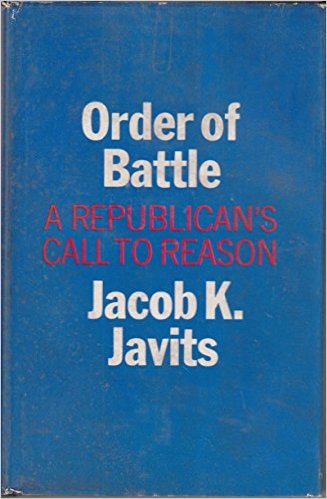JACOB JAVITS was an American politician who served as a United States Senator from New York from 1957 to 1981.
Background
Born on Manhattan’s Lower East Side, which he called “the right place for a New York politician of my generation,” Javits came from the intersection of Orchard and Stanton Streets, a particularly bustling Jewish market area, with small shops, clothing stalls, pushcarts, and crow'ded tenement buildings. His father, like many other Jewish immigrants, began working in the garment industry on the Lower East Side until he became the janitor of several tenement buildings.
Born in one of these buildings, Javits was to spend the first and most influential thirteen years of his life in this corner of the immigrant ghetto. It was here that he discovered his talent for persuasion as he helped his mother hawk used kitchenware. Critical of his father, who passed favors for the Democratic Tammany Hall, Javits developed a distaste for petty corruption and this aversion was to be at the core of his commitment to public service. Even as a young child, he was acutely aware of the diverse ethnic groups surrounding his Jewish part of the ghetto: Italians, Irish, Germans lived to the west, and Jews from Russia, Austria-Hungary, Poland, and the Baltic countries to the east, all struggling to become American.
Education
Having started to work as a young child, Javits sold lithographic supplies by day in order to finance his studies at Columbia University by night.
Career
Upon obtaining a law degree from New York University, he went into partnership with his brother and made a reputation as a trial lawyer. During World War II he served with the U.S. Army, leaving with the rank of lieutenant colonel. He was drawn to politics by the New York mayor, Fiorello La Guardia. He was first elected to the Senate in 1956, after having served in the House of Representatives for eight years (1946-1954) and as attorney general for New York State. His massive influence on voters was remakable and he won as a Republican candidate when New York had been voting consistently for the Democrats.
However, he was, not immediately accepted in the inner circles of Senate power. He was an outsider partly due to his reputation as a maverick who, as a Liberal Republican, often held Democratic views, and partly due to his different background and social habits. Unlike most senators, Javits was known for his unfailing attendance at Senate committee meetings, where he would readily plunge into every available political debate of the postwar era. In a national poll of 1980, he was ranked the third most persuasi\fe debator and the fourth most respected senator. He was reelected to the Senate eight times, serving for twenty-four years.
In the hope of preventing future Vietnams, Javits was instrumental in the drafting the War Powers Resolution of 1973 and in its passage over President Richard M. Nixon’s veto. This was the first time in over two hundred years of American history that an attempt was made to draw the line between the presidential and congressional powers, thus limiting the president’s power as commander-in-chief. In 1974 Javits helped create the Pension Reform Act as well as the National Endowment for the Arts.
Views
He was a leading proponent of civil rights, foreign affairs, and progressive labor legislation. As an active supporter of Israel, he was of great influence in galvanizing public opinion and in working toward a harmonious relationship between the United States and Israel. From 1969 he was a member of the Senate Foreign Relations Committee. Afflicted with a paralyzing nerve disorder toward the end of his life, Javits continued to demonstrate the phenomenal drive and energy that characterized him throughout his lifetime. He kept up with a busy schedule of speeches and continued to be active in important issues such as rights for the terminally ill.






